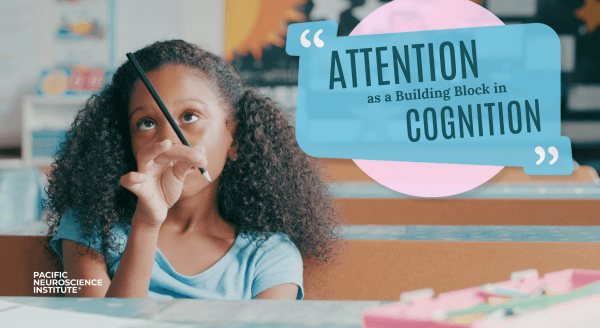

Attention as a Building Block in Cognition
by PNI Experts
Do you have problems with paying attention? This might be affecting your memory. Learn more about the intricate connection between attention, cognition and memory with Dr. Jesus Barreto Abrams, an expert neuropsychologist at Pacific Neuroscience Institute®.
Attention is a fundamental component of cognitive function, serving as the foundation for building other cognitive constructs. When we pay attention, we actively engage with information, facilitating the processes of perception, memory, and learning. Without attention, our ability to process and retain information diminishes significantly.
The Role of Attention in Memory
One common misconception is mistaking memory issues for true memory deficits. In reality, many perceived memory problems stem from inadequate attention. If we do not focus on the information at hand, it is unlikely to be encoded effectively, leading to poor recall. This underscores the importance of attention in the initial stages of memory formation. Research shows that attention is crucial for encoding information into memory, and without it, memory retention suffers significantly.
Causes of Attention Issues
Several factors can contribute to attentional problems, which in turn affect cognitive processes:
- Attention Deficit Disorder (ADD): Individuals with ADD often struggle with sustaining attention, leading to difficulties in cognitive tasks that require focus. This condition is characterized by persistent patterns of inattention and impulsivity that interfere with daily activities and development.
- Vascular Concerns: Issues such as poor blood flow to the brain can impair attention, affecting overall cognitive health. Vascular health is crucial for maintaining adequate brain function, and any disruption can lead to significant cognitive decline.
- Infections: Prolonged symptoms of infections can disrupt cognitive processes, including attention, leading to broader cognitive issues. Chronic infections and inflammation can affect the brain’s ability to maintain focus and process information efficiently.
Impact of Distraction
Our brains have the ability to focus in noisy environments, distinguishing between enhancing relevant information and tuning out distractions. This occurs through an intricate coordination of multiple attention mechanisms. The brain can separately control the enhancement of relevant information and filter out of distractions, enabling complex mental focus. However, in increasingly distracting environments, these mechanisms may begin fail. Distractions can significantly hinder the ability to complete tasks. For instance, reading can become challenging if one cannot concentrate, leading to fragmented understanding and retention of information. Distractions deplete attentional resources, making it difficult to maintain focus on the task at hand. Research has shown that distractions not only affect the quality of task performance but also impair the brain’s ability to encode information into memory effectively
Strategies to Improve Attention
Understanding these factors highlights the critical role attention plays in cognition, emphasizing the need for strategies to improve attentional focus for better cognitive health. Techniques such as mindfulness meditation, cognitive-behavioral strategies, and environmental modifications can help enhance attentional capacity. Additionally, addressing underlying health issues, such as managing ADD or improving vascular health, can also lead to better cognitive outcomes.
In summary, attention is a vital building block in cognition, affecting various cognitive processes, including memory and learning. By recognizing and addressing the factors that impair attention, we can improve cognitive health and enhance our ability to process and retain information.
Treatment at Pacific Neuroscience Institute®
If you or a loved one is concerned about inattention or difficulties with focus, the clinical neuropsychologists at Pacific Neuroscience Institute can help. They can evaluate your symptoms and provide a treatment plan to support you.
For more information contact PNI’s Brain Health Center experts:
PNI-South Bay: 424-212-5361
PNI-Santa Monica: 310-582-7641
Neuropsychology Specialists
Patients consult with one of our highly-trained neuropsychology experts. Our team conducts adult and geriatric neuropsychological assessments. In addition, our specialists care for patients with neurobehavioral health symptoms related to various neurological illnesses, or age-related neurodegenerative disorders. Conditions include: Aging and dementia, Dementia with Lewy Bodies, Parkinson’s disease, Other movement disorders, HIV, Traumatic brain injury, Brain tumor, and Epilepsy.
About the Author
PNI Experts
Last updated: September 18th, 2024




